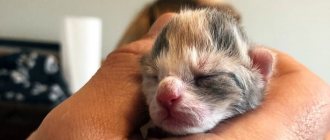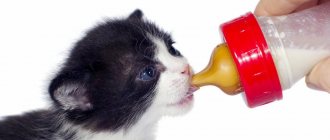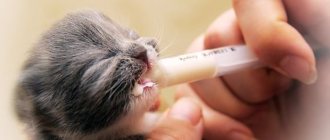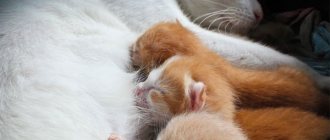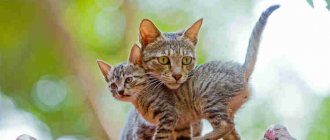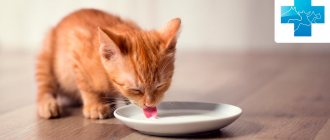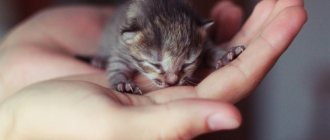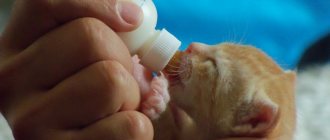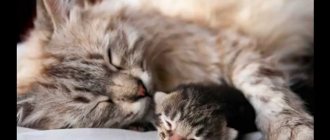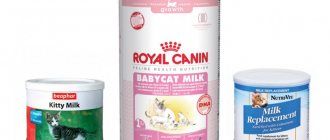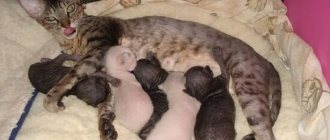In most cases, all care for newborn kittens falls on the mother cat, while the owner plays the role of a kind of assistant.
However, it also happens that for some reason very young kittens are left without a mother or the cat does not have milk, and they need human help. How can I help them? Let's try to figure it out.
Hunger is the main problem facing kittens, and therefore, all the owner’s efforts must be devoted to feeding the kittens and supporting their developing body. The process of feeding a kitten is not simple, and therefore the slightest nuances are important. Before you start feeding a kitten, it is advisable to obtain basic knowledge about its growth and development.
One of the most important indicators that a kitten is developing is weight gain. This is why it is necessary to weigh the kitten daily in the first couple of weeks of its life. Subsequently, weighing can be done every 3 days.
A newly born cat baby should weigh about 110-125 grams. Properly fed kittens will double this weight in a week. Then the kitten should gain about 100 grams weekly. Small weight gains indicate either illness or malnutrition.
Cat food
The cat produces milk immediately after giving birth. This is how nature intended it. Newborn kittens should be fed mother's milk upon birth to get the most out of the antibody-rich colostrum.
In order for milk to appear, you need to feed the nursing mother. Bring some food and water to the animal and place it near her. A cat is unlikely to want to leave her kittens and go far from them to eat. If your cat refuses to eat immediately after giving birth, there is no cause for concern, just offer food a little later.
In order to ensure the health of not only the mother, but also her children, the diet of a nursing cat after birth should be varied and high in calories. Don't limit the serving size. Give as much as he asks. She needs to gain strength.
So, what to feed your cat after giving birth:
- Protein. It is an important building material for any living organism. During the feeding period, part of the supply will be used to produce milk, so you will need to replenish it daily. Give meat, dairy products, fish, eggs.
- Calcium. This element is needed for high-quality milk, as well as to prevent hair loss and tooth decay. Calcium is found in dairy products (milk, kefir, sour cream, cheese).
- Plant products. Oats, lemon balm in milk, cumin, carrots, dandelion - all these plant products will improve lactation.
If a cat refuses to eat after giving birth, then you will need to stimulate her appetite with her favorite food or feed her with a syringe. The animal needs strength and high-quality milk, without which the kittens will simply die.
What food and how much should you give your kitten?
The daily weight gain of a kitten is about 20 grams. Each gram of increase entails an increase in the amount of mixture by 4-5 grams. A more detailed feeding schedule is as follows.
A kitten aged 1-2 days should drink 30 grams of mixture per 0.1 kg of weight. Feeding should be done every 2 hours. A kitten aged 2-4 days should drink 30 grams of mixture per 0.1 kg of weight. Feeding should be done every 2 hours during the day and every 3 hours at night. A kitten aged 5-13 days should drink 38 grams of mixture per 0.1 kg. Feeding should be done every 4 hours. A kitten aged 13-22 days should drink 46 grams of mixture per 0.1 kg of weight. Feeding should be done every 4 hours. From the 15th day, give the kitten liquid milk porridge with an egg. From day 22, offer other products - beef and fish minced through a meat grinder, baby food, low-fat cottage cheese, egg yolk.
After feeding, check that each kitten has been fed. Well-fed kittens sleep, but hungry kittens scream, crawl away and try to suck the outstretched finger. Be sure to feed hungry kittens. After 4 weeks, introduce the kitten to the bowl by wetting its mouth with the mixture and bringing it to it
After childbirth
Complications after giving birth to a cat can occur at any time. These can be problems of any nature. Quite often, a cat does not have milk after giving birth. However, there is no need to worry about the first three days, because colostrum comes first, and it is quite enough to feed newborns. The presence of milk must be stimulated by good nutrition and calmness of the animal itself.
If the kittens still don’t get enough to eat and are constantly screaming, then you will have to supplement them with boiled cow’s or goat’s milk from a pipette
If a cat is restless after giving birth, behaves strangely, and constantly meows, this may mean that something hurts. Mastitis in cats is a common problem. When there is too much milk and babies do not have time to eat it, then it accumulates and turns sour. In this case, the animal will also need your help. Express it a little and carry out the necessary hygiene procedures.
In addition, you may observe diarrhea in your cat after giving birth, however, this is normal. Postpartum diarrhea can be caused by emotional shock after an experience or poor quality feeding.
How can you tell if your cat is producing milk?
A cat not producing milk for her babies is anything but normal. During pregnancy, a cat's breasts prepare for future milk production. The glands increase in size, and immediately after childbirth they begin to produce colostrum. This first milk for cats is very nutritious and has an important immunological function. Kittens are vulnerable at birth, so they need protection from bacteria, viruses and anything that can affect their immune system. This is one of the reasons why a cat will nest before giving birth. They need to protect their newborn.
© shutterstock
After colostrum, regular cat milk is produced. Milk is secreted through the nipples on the cat's chest. Kittens will grab with their mouths and knead their chests with their paws as they grow. This is done to stimulate lactation (milk production). This also helps the kittens bond with their mother.
Sometimes you may see milk leaking or just see it around your kitten's mouth. However, this will not always be the case. However, you can tell that milk is being produced if the kittens cuddle up to their mother's belly and suck on her nipples. Kittens intuitively know how to suck. They will nurse or sleep. When the mother has no problems with lactation, the kittens will be calm. They are well fed and their mother takes care of other needs. There should be no need to manipulate the mother's breasts to induce secretion.
Normal discharge
After the birth of kittens, the owner must carefully monitor the temperature and discharge of his pet. The birth of kittens ends with discharge. Initially they may be brown or streaked with blood - this is normal.
Postpartum discharge from the loop is an integral part of the body’s recovery. After childbirth, the uterus contracts and expels clear mucus residue. This can last up to three weeks. Veins and a greenish tint in some cases can be considered normal, and in some cases they can be life-threatening. Here you will need the help of a doctor.
When should milk appear?
In principle, in this case there are options depending on the characteristics of the organism of a particular animal. In most cases, its secretion begins immediately after the birth of kittens, being stimulated by a powerful flow of hormones. But often the first drops of milk (colostrum, to be precise) can be seen about five days before the kittens are expected to be born.
Everything is very individual. Moreover, there are cases when, due to stress (or other reasons that remain unknown), milk appears in pets about a couple of hours after birth . Its secretion in such situations is stimulated by hungry kittens, who begin to “gnaw” their mother’s nipples more and more. Considering that the latter have a mass of nerve receptors, such simple mechanical stimulation in many cases can completely solve the problem of lack of milk. But not always, unfortunately.
Factors inhibiting the process of milk production
The reasons are very varied. First, remember that a cat that has just given birth is a gentle and sensitive creature. She is especially susceptible to various stresses. Do not forget that any animal that gives birth is primarily guided by its maternal instincts, which tell it to ensure maximum safety for the babies born. It is for this reason that all experienced veterinarians advise in advance to accustom the cat to the basket or box in which, in the owner’s opinion, it will have to give birth.
In addition, it is advisable to choose in advance the place where to put it: under no circumstances choose corridors and other passage rooms for this purpose. Carefully instruct your family members not to constantly walk around and “look after” the cat that has given birth. Believe me, the animal is quite capable of independently taking care of both itself and all its cubs. Excessive “care” will lead to stress, as a result of which the cat will constantly drag the kittens from place to place. From these same shocks, she may well lose milk.
Dangerous discharge from a cat after giving birth
Sometimes it happens that childbirth ends in complications. This occurs due to infection or tissue damage (rupture of tracts). The first sign of dangerous consequences may be a cat’s bloody discharge with an unpleasant odor after giving birth. Bleeding should not last more than 10 minutes. If after this time there is still bloody discharge, then your pet already needs professional help.
Remember, it is difficult to confuse such bleeding with normal discharge. With pathological discharge, the blood is bright scarlet, possibly with the presence of a large number of clots. Normal discharge is brown.
A cat with complications will be constantly in a recumbent state. Don't give her the opportunity to get up. Let him lie there until the doctors arrive. If there is bleeding, the first thing you need to do is take the cat's temperature. If there is no increase in temperature, perhaps the bleeding is due to incomplete disposal of the placenta, a dead fetus (the kitten died in utero) or unsanitary conditions. Scarlet blood with green streaks requires urgent veterinary attention.
Dangerous postpartum hemorrhage
If postpartum bleeding turns yellowish, gray or cloudy green, then this indicates an inflammatory process of the uterus or its walls. Such manifestations can lead to the death of your pet, so you cannot do nothing. If the diagnosis shows that the lesions are serious, then the cat will have the uterus removed.
Symptoms of acute inflammation:
- increased body temperature;
- apathy and lethargy;
- abandonment of offspring;
- complete loss of appetite.
Complications immediately after childbirth can lead to the development of dangerous diseases. This could be pyometra or endometritis. With the latter, the cat screams loudly, arches its back and tries to sit up. In case of illness, kittens are taken from their mother and fed artificially.
You should also not ignore discharge that has a pungent, rotting or sour odor. Call a veterinarian to your home as soon as possible.
Symptoms of eclampsia in cats
Eclampsia is a disease in which a cat experiences a critical decrease in calcium in the blood plasma after giving birth. At increased risk are primiparas, animals with multiple pregnancies and already mature cats. In addition, the disease develops against the background of unbalanced feeding, when the pet’s diet contains few foods containing calcium (dairy products).
Eclampsia in cats after birth has pronounced signs. They are impossible not to notice. The first thing you may notice is the new mother's anxiety. She is trying to hide the kittens; she will constantly drag them somewhere. Or it could be the other way around – complete abandonment of offspring.
Main symptoms:
- apathy;
- pallor of the mucous membranes and conjunctiva;
- rapid breathing;
- increased salivation;
- refusal of any food;
- temperature increase.
All these manifestations will be of an increasing nature. It will be necessary to notice this behavior and condition of the animal in time and consult a doctor.
First feeding - when to start
For the first 3–4 weeks, kittens will feed exclusively on milk. This period will be a difficult time for both you and the babies, as you will not sleep at night and they will struggle to live.
Note! Practice shows that kittens that were artificially fed begin to consume supplementary food earlier. Their gastrointestinal tract quickly adapts to new products, since it is populated by more aggressive microflora.
When should I start feeding kittens for the first time? There is no clear answer to this question. Starting at three weeks of age, when kittens can distinguish silhouettes and smells, offer liquid supplementary food.
Be sure to heat food, as kittens instinctively consider cold foods inedible.
What to feed
How to feed kittens so as not to cause problems with digestion of food? The following are considered safe natural products:
- Whole goat or cow's milk.
- Low-fat broth (beef, rabbit, turkey).
- Boiled minced meat mixed with broth and homemade meat pate.
If kittens are weakened, suffer from indigestion or are not gaining weight well, it is better to supplement them with industrial products:
- Ground semi-moist food diluted with low-fat broth.
- In case of growth retardation - pate for emaciated kittens.
Pate for weakened animals is high in calories, has an attractive smell and taste, so most kittens consume it with pleasure.
Advice! Such products should be introduced into the diet only when necessary, since sudden weight gain has a detrimental effect on the functioning of the cardiovascular system.
Endometritis
There are many factors that threaten the life of a giving birth cat. If after giving birth a cat's discharge turns white, you should be wary, because it could be endometritis. Endometritis is a disease characterized by the development of an inflammatory process of the uterine mucosa. This condition is fraught not only with further infertility, but also with the death of the animal.
Symptoms of endometritis:
- thirst or refusal to eat;
- lethargy and apathy;
- body temperature is increased;
- the animal is in search of a cool place;
- the fur under the tail is wet;
- pain in the abdomen due to which the animal screams painfully;
- milk disappears;
- abandonment of kittens (often the cat throws them out of the nest).
White discharge in cats after birth occurs due to infection of the genital organs with fungi, streptococci, and E. coli.
Pyometra
Postpartum pyometra is a complex pathological disease that cannot be ignored. There is no point in treating the disease; you need to immediately take the cat for surgery. This is the only way you can save your pet’s life.
There are many reasons for the development of the disease. These are mainly birth injuries, a weak immune system, lack of sterility during childbirth and, as a result, infection. Pyometra is accompanied by inflammation and accumulation of pus and mucus in the uterus. The inflammatory process then spreads throughout the reproductive system.
Main symptoms:
- swelling and enlargement of the labia;
- anxiety;
- thirst;
- refusal to eat;
- polyuria;
- rapid breathing;
- temperature;
- trembling in the body.
The disease develops rapidly and it is difficult not to notice its development. The cat breathes frequently and licks its fur to such a state that bald spots appear.
Sterilization of a cat after birth
The question of sterilizing cats comes to mind for many owners. Especially if such a need arose immediately after childbirth. Is it possible to sterilize and how long after birth can a cat be sterilized? There is no clear answer. This depends on several factors, the first of which is feeding the kittens. If a pet feeds its offspring, then veterinarians recommend waiting 2-3 months.
Sterilization of cats after birth is not carried out immediately for two reasons:
- If you start the procedure immediately after lambing, the walls of the uterus will lose their elasticity, and this can lead to complications for the health and life of the animal.
- Spaying during postpartum heat is dangerous, as it carries a huge risk of infection.
If two individuals of the opposite sex live in the house, and you want to protect the cat from unwanted pregnancy, then it is worth castrating the male.
Veterinarians advise spaying immediately after the end of postpartum estrus. However, after the operation the pet will need special care. There may be side effects such as indigestion, vomiting, and trembling. To prevent inflammation from occurring, postoperative sutures will need to be treated.
Of course, you can sterilize a cat after giving birth, but these are exceptional cases. The pet must be healthy and have a good appetite. If the doctor does not identify any contraindications, the operation will be performed.
How and what to give to kittens if their mother has not started lactation?
In ideal cases, it is necessary to find another nursing cat and “throw” new cubs at her . In this case, you need to take a “donor” litter kitten and carefully wipe the foundling on it. Otherwise, the cat will not accept a baby that smells like another animal.
Important! You can feed babies ONLY with a special substitute intended specifically for kittens. The use of cow's and goat's milk for these purposes is not allowed.
Their composition is radically different from that of cats, and therefore the use of such “ersatz” often leads to severe diarrhea. The latter, as you know, is deadly for small kittens! Babies can die from dehydration within hours.
What brands of “baby food” can I use to feed kittens? In our country, they are produced by famous manufacturers, such as Royal Canin, Beaphar, Canina.
Considering that they are not found in every pet store, it is advisable to consult with a veterinarian in advance. When using such tools, remember the following:
- You can find both liquid and powdered substitutes on sale, and the latter, as you might guess, must be diluted with boiled, settled and warm water before use. As a rule, it is necessary to comply with the same requirements and recommendations as in the case of baby food (i.e., it must be diluted thoroughly, without lumps, the temperature of the finished mixture is within 37-38° Celsius.
- Remember that there are milk formulas on sale intended for feeding adult cats. Such mixtures are ordinary skim cow's milk, from which all lactose has been additionally removed. Diverging slightly from the topic, we note that such food does not bring any particular benefit to adult cats (nor does it cause any harm). It can be given to kittens only in extreme cases, when there are no other options. Moreover, this should be done no more than two or three times, while searching for more suitable food for them.
Let's assume that you don't have milk or formula. What else can you give kittens? Experienced veterinarians say that babies can be given thick rice water . Of course, there are not enough nutrients there, but this thick jelly will allow the kittens to fill their tummies and fall asleep. At this time, you can also find a suitable milk formula for them.
Treatment of a cat after birth
If you are worried about the condition of the new mother and you don’t know if everything is okay, then contact your veterinarian. Today, modern diagnostic methods make it possible to identify any postpartum complications. If necessary, Oxytocin is administered to the cat after birth. The injection helps stimulate lactation, accelerates recovery of the uterus and prevents infections of the reproductive system.
The doctor will prescribe treatment for pathological discharge, taking into account the diagnostic results and the animal’s symptoms. To stop severe bleeding, vasoconstrictor or hemostatic medications will be prescribed. If anti-inflammatory processes have begun in the uterus, then anti-inflammatory or antibacterial agents will be needed.
In order to strengthen the health of a weakened cat, the doctor will recommend a therapeutic diet, vitamins, immunomodulators and mineral complexes. In the most severe cases, surgery is performed. Kittens are separated from their mother and fed artificially.
